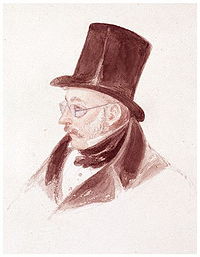
William Hay Macnaghten
Encyclopedia

British Raj
British Raj was the British rule in the Indian subcontinent between 1858 and 1947; The term can also refer to the period of dominion...
, who played a major part in the First Anglo-Afghan War
First Anglo-Afghan War
The First Anglo-Afghan War was fought between British India and Afghanistan from 1839 to 1842. It was one of the first major conflicts during the Great Game, the 19th century competition for power and influence in Central Asia between the United Kingdom and Russia, and also marked one of the worst...
.
He was the second son of Sir Francis Macnaghten, Bart., judge of the supreme courts of Madras
Chennai
Chennai , formerly known as Madras or Madarasapatinam , is the capital city of the Indian state of Tamil Nadu, located on the Coromandel Coast off the Bay of Bengal. Chennai is the fourth most populous metropolitan area and the sixth most populous city in India...
and Calcutta, and was educated at Charterhouse
Charterhouse School
Charterhouse School, originally The Hospital of King James and Thomas Sutton in Charterhouse, or more simply Charterhouse or House, is an English collegiate independent boarding school situated at Godalming in Surrey.Founded by Thomas Sutton in London in 1611 on the site of the old Carthusian...
. He went to Madras as a cadet in 1809, but in 1816 joined the Bengal Civil Service. He displayed a talent for languages, and published several treatises on Hindu
Hindu law
Hindu law in its current usage refers to the system of personal laws applied to Hindus, especially in India...
and Islamic law
Sharia
Sharia law, is the moral code and religious law of Islam. Sharia is derived from two primary sources of Islamic law: the precepts set forth in the Quran, and the example set by the Islamic prophet Muhammad in the Sunnah. Fiqh jurisprudence interprets and extends the application of sharia to...
. His political career began in 1830 as secretary to Lord William Bentinck
William Bentinck
William Bentinck may refer to:* William Bentinck, 1st Count Bentinck * William Bentinck , Royal Navy officer* Lord William Bentinck , British statesman...
; and in 1837 he became one of the most trusted advisers of the governor-general, Lord Auckland, with whose policy of supporting Shah Shuja against Dost Mahommed Khan, the reigning amir of Kabul
Kabul
Kabul , spelt Caubul in some classic literatures, is the capital and largest city of Afghanistan. It is also the capital of the Kabul Province, located in the eastern section of Afghanistan...
, Macnaghten became closely identified.
He was created a baronet in 1840, and four months before his death was nominated to the governorship of Bombay. As a political agent at Kabul he came into conflict with the military authorities and subsequently with his subordinate Sir Alexander Burnes
Alexander Burnes
Captain Sir Alexander Burnes was a Scottish traveller and explorer who took part in The Great Game. He was nicknamed Bokhara Burnes for his role in establishing contact with and exploring Bukhara, which made his name.-Early life:He was born in Montrose, Scotland, to the son of the local provost,...
. Macnaghten attempted to placate the Afghan chiefs with heavy subsidies, but when the drain on the Indian exchequer
Exchequer
The Exchequer is a government department of the United Kingdom responsible for the management and collection of taxation and other government revenues. The historical Exchequer developed judicial roles...
became too great, and the allowances were reduced, this policy led to an outbreak. Burnes was murdered on 2 November 1841; and under the elderly General William Elphinstone, the British army in Kabul degenerated into a leaderless mob.
Macnaghten tried to save the situation by negotiating with the Afghan chiefs and, independently of them, with Dost Mohammad's son, Akbar Khan
Akbar Khan
Amir Akbar Khan Amir Akbar Khan Amir Akbar Khan (1816 – 1846;, born as Mohammad Akbar Khan and famously known as Wazir Akbar Khan, was an Afghan Prince, a general, a tribal leader and Emir. He was active in the First Anglo-Afghan War, which lasted from 1839 to 1842...
, by whom he was captured and, on 23 December 1841, assassinated by Khan placing a pistol in Macnaghten's mouth. This very soon became an inspirational story among the Afghans, with the disastrous retreat from Kabul and the Massacre of Elphinstone's army
Massacre of Elphinstone's Army
The Massacre of Elphinstone's Army was the destruction by Afghan forces, led by Akbar Khan, the son of Dost Mohammad Khan, of a combined British and Indian force of the British East India Company, led by Major General William Elphinstone, in January 1842....
in the Kurd Kabul Pass following. These events threw doubt on Macnaghten's capacity for dealing with the problems of Indian diplomacy, though his fearlessness and integrity were unquestioned.
Appearances in fiction
Macnaghten appears in the first volume of the Flashman Papers, being depicted as ambitious, arrogant and a megalomaniaMegalomania
Megalomania is a psycho-pathological condition characterized by delusional fantasies of power, relevance, or omnipotence. 'Megalomania is characterized by an inflated sense of self-esteem and overestimation by persons of their powers and beliefs'...
c.

